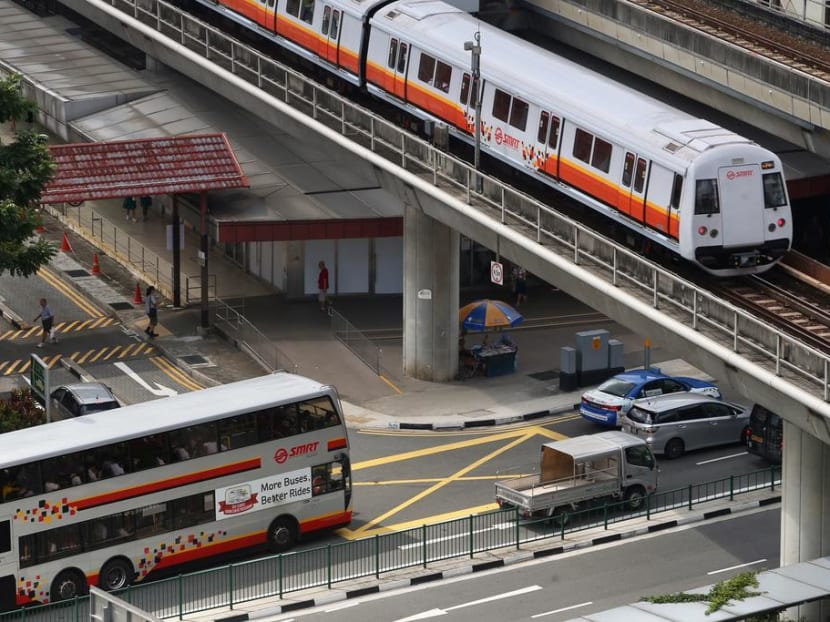Public transport ridership falls to 60% of pre-pandemic levels; Govt to relook financial impact when Covid-19 stabilises: Iswaran
SINGAPORE — Public transport ridership is now at about 60 per cent of pre-pandemic levels, but the authorities will review the financial impact of this fall only when the Covid-19 situation stabilises, Transport Minister S Iswaran said on Monday (Sept 20).

Transport Minister S Iswaran said the authorities would wait until the Covid-19 situation stabilises before assessing the financial impact of lower ridership.
- The Government should not be “drawing conclusions” about financial sustainability during a crisis period, Transport Minister S Iswaran said
- Instead, its focus now is to ensure public transport runs reliably and remains safe for commuters
- Slightly less than 10 per cent of bus captains have been affected by recent Covid-19 clusters at bus interchanges
SINGAPORE — Public transport ridership is now at about 60 per cent of pre-pandemic levels, but the authorities will review the financial impact of this fall only when the Covid-19 situation stabilises, Transport Minister S Iswaran said on Monday (Sept 20).
“I think we should not be drawing conclusions from what might be happening in a crisis period, because this may or may not be indicative of what might be the longer-term trajectory,” Mr Iswaran told reporters on the sidelines of a conference commemorating the Ministry of Transport’s 20th anniversary.
He added that he did not wish to “prejudge” whether fares may be hiked later this year.
Recently updated data on the Land Transport Authority (LTA) website shows that amid the tightened movement restrictions last year, bus and train riderships fell to their lowest levels in more than a decade.
Bus ridership fell 30 per cent to 2.88 million rides a day on average for 2020, the lowest since 2006. MRT ridership dropped 40 per cent to 2.02 million rides a day, the lowest since 2009.
The fall in ridership raised questions about the financial sustainability of the public transport system, given that the Government has already been spending about S$2 billion each year to subsidise bus and rail operations.
In March, former Transport Minister Ong Ye Kung had said in Parliament that transport fares are not sufficient to cover operating costs and that steps must be taken — including adjusting fares — to keep the bill to taxpayers from “ballooning”.
Mr Iswaran said on Monday that the Government will assess the longer-term financial sustainability of the transport network once the Covid-19 situation stabilises and the number of people returning to work settles.
“Then we will have a chance to relook at this and see whether there is a need to review this,” Mr Iswaran said.
At the latest annual fare review by the Public Transport Council (PTC) last year, the council decided to keep public transport fares unchanged in a bid to help commuters mitigate the impact of the pandemic.
The council said then that it will likely not raise fares in 2021 as well if the economic fallout from Covid-19 continues into the year.
Asked if commuters should expect to pay higher fares this year, Mr Iswaran said that he did not want to “prejudge” the fare review process and that the PTC will make an appropriate announcement in due course.
The Government’s focus right now, he said, is to ensure public transport services run reliably and that they remain safe for Singaporeans to use.
Giving an update on the Covid-19 outbreaks at bus interchanges, he said that slightly less than 10 per cent of bus captains have been affected by the clusters, including those who had to isolate themselves after coming into close contact with infected cases.
Other than five express bus services, no other services have been withdrawn, he said. He added that the authorities and the bus operators have been working hard to redeploy staff members to minimise the impact on bus services.
“Up to now, a very small percentage of bus services were really affected in terms of perhaps the lengthening of headways and so on. That is something that we would like to avoid but it’s difficult because of the reduction in manpower,” he said.
SHIPPING STAYS STRONG, AVIATION CARGO AT PRE-PANDEMIC LEVELS
Despite the drag Covid-19 has had on public transport, one bright spot is the maritime sector, which has remained the top transhipment port in the world.
By swiftly adapting to restrictions by introducing contactless harbour operations, for example, Singapore’s ports have managed to keep its supply lines intact, Mr Iswaran said during his speech at the conference.
From January to July this year, container throughput grew 3 per cent compared to the same period in 2019, meaning volumes are now above pre-pandemic levels.
“As a result, Singapore is now widely regarded as a ‘catch-up port’ where shipping lines can make up for delays elsewhere,” Mr Iswaran said.
The aviation sector, too, has managed to adapt to international travel restrictions, with cargo volume through Changi Airport now having recovered to pre-pandemic levels.
He noted that Singapore Airlines (SIA) was one of the first airlines to use passenger aircraft to carry freight.
Passenger travel is still a “far cry” from the past, Mr Iswaran said.
Changi Airport is now operating only at about 3 per cent of pre-Covid levels and SIA at 4 per cent, he noted.
Mr Iswaran pledged that the Government will take steps to revive Singapore’s air hub and restore connectivity.
“It may take some time for global air travel to normalise. But make no mistake, we will do our utmost to ensure Changi thrives again and SIA soars again.”











